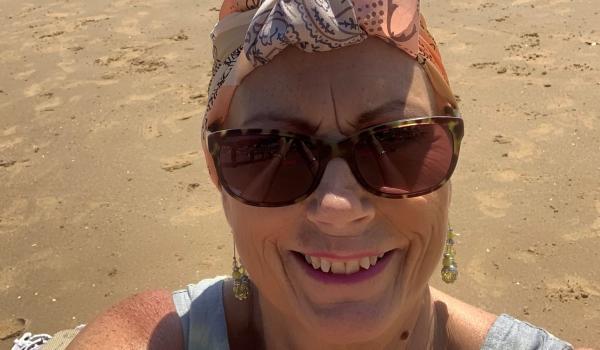It’s hard not to feel let down due to covid. There are people out there who are being missed because of the pandemic. When you also live alone it can be a lonely place. Your whole world has been hijacked by cancer and then coronavirus compounds that. It takes a big mental toll.
Diagnosis
I was having attacks of diverticulitis – something I’d experienced for 15 years – but because of covid I wasn’t being examined. I was also struggling with bloating which was dismissed as part of the diverticulitis. On reflection, I wish I’d been more forceful because I know my own body and I knew something was wrong. I had no awareness of the symptoms of ovarian cancer beforehand, it never even came up on my radar. I just knew something wasn’t right.
After that, things began moving quickly. I got to my GP and was referred for more tests. Soon after that I was diagnosed with stage III ovarian cancer, and I started chemo a month later. I knew a little bit about what to expect and the importance of pacing myself and listening to my body.
I initially had three rounds of chemo, followed by surgery and then more chemo. I made the decision to have my hair cut short just before I started treatment – which turned out to be a good decision. I chose a wig that was like my existing hair, but I didn’t find being bald too bad in the end. In fact, during the summer it was quite liberating.
Support and Coronavirus
Having treatment during coronavirus wasn’t nice. I was lucky I was able to take someone with me for every appointment but for stays in hospital I was alone a lot of the time. I also had to do lots of testing ahead of treatment – with regular PCR tests – and then isolate on the days in-between.
Fortunately, I was still able to access lots of help – particularly through my local Maggie’s Centre, and Macmillan. Everyone has been so supportive and given really good advice, and the financial support has been great. I've also got such great friends. They came round to my house to help with the housework for me and would stay with me after chemo. It’s nice to have someone with you giving you support.
Life after cancer
I try to live a normal life; I try to keep myself busy – but occasionally I get that feeling and I wonder if it had been caught a little earlier what would my life be like now?
I’m a pragmatic person but I have found it difficult to explain the process to friends. Soon after my diagnosis I discovered I carry the BRCA2 mutation. I've had to explain this to my friends and make them understand that my cancer may come back.
I am now on the PARP inhibitor olaparib, and whilst this drug has its own unique side affects I’m managing most of the time and have been able to go back to work two days a week.
I wanted to share my story to help raise awareness. If there had been more information out there perhaps my cancer would have been picked up sooner or I would have pushed to be seen more quickly. I think awareness is something we should all be armed with.
If you’ve been affected by this story and would like to speak to a specialist nurse, you can call our dedicated support line on 020 7923 5475 or contact us: [email protected]. We're open from 9am until 5.30pm, Monday to Friday.
If reading this story has helped you, join the Ovarian Cancer Community to connect with more people affected by ovarian cancer: www.targetovariancancer.org.uk/onlinecommunity



